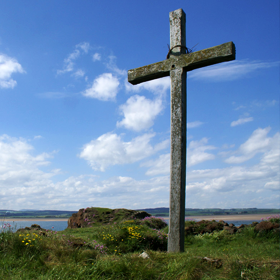Why are there bad people in the world, like pedophiles, rapists and serial killers?
Pastor Ryan of Palm Valley Church: The answer to this question is the same as the answer to the question, “Why are there bad people in the world, like liars, thieves and adulterers?” Contrary to popular belief, the Bible does not categorize bad behavior by degree of severity. ALL bad behavior is called sin, and sin infects and affects EVERYONE. So, the better question is this: “Why does God allow sin?”
When God created human beings, He gave us all the ability to make choices on our own. We call this “free will.” God’s purpose for humans, His image bearers, is that He would love us and we would love Him in return and bring glory to Him. In order to truly love and glorify God, there needs to be a choice. Think of it this way: I could create a robot that I program to do certain tasks that I desire and say certain things that I want it to say, but that is not the same as raising a child who makes a conscious decision to love and honor his or her parents. It’s different because there was a choice.
Unfortunately, at times, the ability to choose is complete freedom. A person can use their free will to choose right, and a person can also use their free will to choose wrong. This is how sin enters the picture. God does not want us to sin. God does not make us sin. We choose to rebel from God’s moral standards. The Apostle Paul, in his letter to the Romans, addresses the fact that everyone knows when they have broken God’s moral standards:
“Even Gentiles, who do not have God’s written law, show that they know his law when they instinctively obey it, even without having heard it. They demonstrate that God’s law is written in their hearts, for their own conscience and thoughts either accuse them or tell them they are doing right.” Romans 2:14-15
So, what’s the bottom line? There is sin in the world because God allows us to make choices and we choose wrong.
God’s standard is perfection, so ANY sin creates division between God and us. Although all sin in the Bible is seen as equally convicting in our status with God, not all sin has equal consequences. It is absurd, for example, to compare the consequences of someone telling a lie and someone committing rape. The effect of all sin is damage; the fact is that some acts cause much more damage than others. Because of this, we tend to focus on both the sins that cause the most damage and on the people who struggle with those sins. Then, we try to deal with them separately in a spiritual sense. We forget that there is not a sin hierarchy. No matter what the sin is, no matter what damage is done, individuals choose to make poor and harmful decisions that ultimately affect themselves and others.
God’s desire is always that we would choose to follow His moral code. It is not His fault or cause that we choose to rebel.
I (Jen) will add a bit about the compounding nature of sin. That is, hurt people hurt people. There are times when people who’ve been hurt by someone, let’s say physically abused, go on to hurt others in the same way. You might think that doesn’t make sense: Shouldn’t they know how bad it felt for them and vow not to do that to others? In many cases, yes. In others, no, because they have not learned another set of coping skills. So, they perpetuate old patterns of handling situations. And so it goes with the intergenerational transmission of sin. Fortunately, we are not doomed to repeat sins that have been perpetrated against us. That, too, is a choice. We can choose to break the cycle by getting help and learning alternative coping skills.

